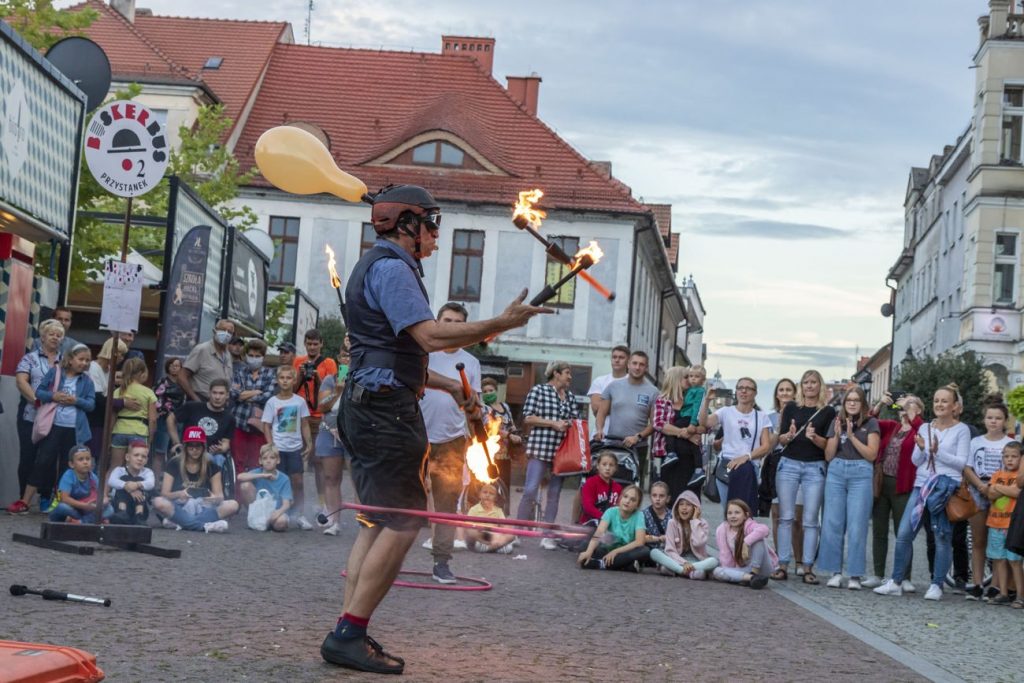
Ian Deadly is an English performer based in Turin who combines circus skills with improvisations. He cut his teeth on the streets of Europe, and he’s always ready to build a crowd, no matter the place and the weather forecast. He likes small towns that seem to have never had a busker there. I have known him for years not only as work hard, play hard street performer, but also a mentor for younger performers. If you are just getting started as a busker, make sure to put his tips on the refrigerator door!
Tip 1. Go to the street and do something with a hat in front of you. Tip 2. Repeat. Go back, that’s the main thing. When you fail, and you will, go back out there. Crushing humiliation and despair is all part of the learning curve. Don’t be afraid to adapt, change things, see what works, discard or change what doesn’t. Watch other shows, take technique but don’t plagiarise. Just do as much as you can.
Ian Deadly
This interview is available also in Polish and Italian.
Cześć Ian! Żołądkowa gorzka czy oczywiście? Które polskie słowo jest Twoim ulubionym?
Cześć Małgosia. Oczywiście za każdym razem mrożona żołądkowa gorzka. I always liked “nieważne”, very useful in any conversation and when dealing with drunk hecklers in a show.
Who did you want to become as a child? What is your background? What was your path of becoming a performer?
As a child I think I wanted to become Strider from The Lord of the RIngs, I received a copy of the book for my eighth birthday from my parents and it made an impression. Then our religious education teacher Mr. Reeves taught some of us how to juggle and I found a book in the school library called The Complete Juggler by Dave Finnegan. In the dark ages before the internet this was The Book for jugglers. It took you from three balls to really complicated stuff and even had an appendage about how to do a street show.
Some years later I had a vague idea of becoming a journalist which evaporated equally as vaguely. Then I applied for university and thought “I like books!” So I studied philosophy and literature. Whilst in Edinburgh I got involved with The Beltane Fire Society, a community arts project that put on Celtic pagan festivals including Beltane where I took part as a fire performer in the beginning before going on to many other roles, round this time we tried our first street experiences. It was in 1997 that I was approached by the Scottish performance group TePooka who threatened to give me money if I went and juggled for Prince Charles.
The first time you performed in the street was 1997 so quite a long time ago. Do you still remember your first impression?
Not that long ago surely! Yes, I can remember. We were a group of four or five people randomly spinning fire on The Royal Mile in Edinburgh, no music, no attempt at doing a show, resolutely staring at the ground, ignoring any audience we might have gathered by accident. If I remember correctly we got about eight pounds total in the hat and spent about 15 pounds on paraffin making a loss of seven pounds. Then I found two pounds in a fountain when I went to go home. A truly great start to my career. We enjoyed being out there but the idea of anyone watching or interacting with them terrified us.
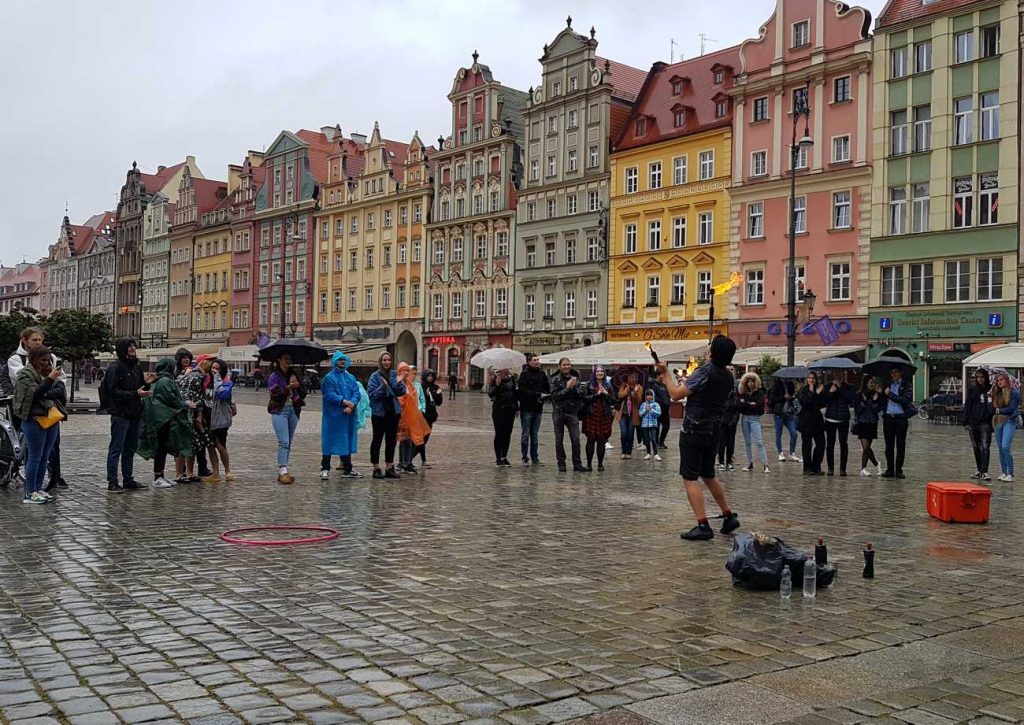
What shows make you stop and stay in the street?
Any. I love watching street shows, I truly do but I have an extremely low tolerance for things I don’t like. Luckily we have different tastes and different people enjoy different shows. There are some extremely popular performers whose show I simply cannot bear to watch. I accept that, it would be boring if we all liked the same things.
I like to see performers who adapt and react to their audience, random occurrences, interruptions, anything out of the ordinary. I am bored with those artists who have their show and are determined to do it in only one way, forever with no acknowledgement that they are in a public place.
Ian Deadly
I love those shows that can react to something that would perhaps ruin someone else’s show but instead incorporate whatever happens into their show, changing it from a negative to a positive happening.
What are your favourite buskers? What are the best street shows you have seen?
I like really sarcastic buskers and anyone ready for chaos. I have been hugely inspired by Peter Weyel from Germany, he always seems ready without hurry to include anything in his show and is not afraid to speak the truth when he sees it. His crowd build is also amazing, he rolls around on the ground like he has no bones to Gregorian Chants as his music and then proceeds to draw a circle in chalk, crawling on his hands and knees with absolutely no energy. A lot of people watch this. Then he starts and shout “Oh yeah! Showtime!” His whole show is a manic depressive fluctuation of energy.
Also I must mention the great Jayko! A duo from Switzerland. I met them on my first BuskerBus and continued to see them through the years and then individually when they started working on their own. More chaos than you can shake a pierogi at. They had no real show, simply a series of hilarious absurdities usually involving audience members, something like Monty Python if they’d done street shows.
Also, like Hayato in the first interview (Hello! Come on, it was 4 am) there are the outstanding Gamarjobat from Japan. I saw them in The Fringe in Edinburgh and we got to host them in our cabaret. The fastest street show in the East. One thing after another leaving no room for the audience to consider leaving, an incredible rhythm and energy and completely hilarious. Finally I’m going to mention Zen Buddhist, an English performer and his character Versilli. I saw him at Glastonbury Festival in 1995 performing in a muddy field. It was very silly. His show starred Kevin The Flying Donkey and reduced us to tears of laughter. I learned a lot watching him even though it was years before I realised that.
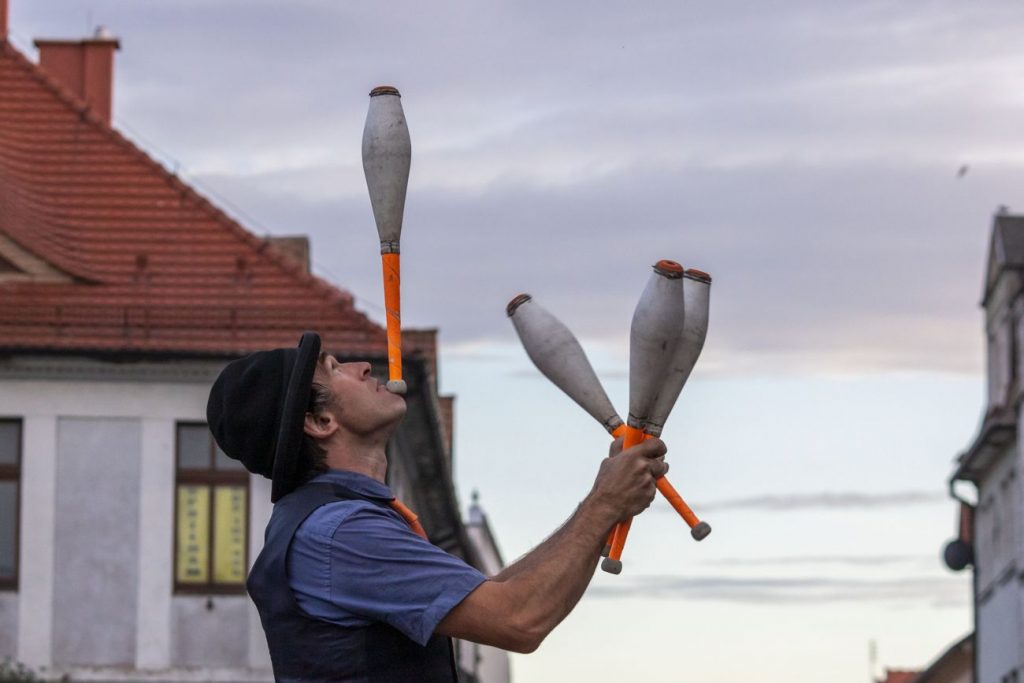
The busking scene vs the street festival scene
You have been a performer for 23 years. How have circus shows and the busking scene, in general, have changed over the years?
I think the main difference is that it is banned nearly everywhere (corona reference). The busking scene is in a way different to the street festival scene. I know many performers here in Italy who never do festivals or never do street outside of festivals. I think the pure street scene is more or less the same everywhere, it’s so difficult to say as I have my bubble of places where I work and the festivals I go to but elsewhere it could be completely different. South America? Asia? Africa? Antarctica? I’ve never been to these places (Oh, I did busk in Marrakech in 2000) so I can’t really say.
I’ve met so many North American and Australia and New Zealand buskers that I feel like I have an idea of what they’re up to. I think you can trace the lineage of various types of show, e.g. The LIMO Show (large impressive metallic object, typically a giraffe unicycle), European Clown Show (usually no speaking, often poetic, smaller hat), Following Shows (making fun out of people in the street as they pass by) and others. I think if you look at most buskers you can see where they are coming from and how they have evolved from these (and other) basic types. Mine is a mixture, I tried poetic for a while but preferred talking.
An important difference is technology. Everyone has an amp and mic if they speak. Remote controls and music samples ready for any contingency. LOUDER amps of course. I see many copies of the same show but rarely something very different.
Another big difference are the circus school shows that are appearing in every street festival. This is another genre, typically circus school graduates with excellent skills put together something that they consider to be a street show (or not even a street show, they often simply do their new circus shows on the street) and offer it to festivals. There are a lot of these and they do really, really well when they have big crowds, everyone loves them but tend to suffer when the situation isn’t so great, fewer people, bad weather and the like. There are also some shows that are from a circus school background but they are also die hard street performers, these are the ones to watch.
Do you think that people are now more used to the idea of busking that they were when you got started or are they still surprised when they see something happening on the street?
It’s just the same. Busking has been around for as long as humans could bang two rocks together in something approaching a rhythm. Anywhere I go people tell me the same thing: “people aren’t used to street shows here in….” I’ve been doing shows in the centre of Turin, here in Italy for fifteen years now and it still works.
There are people who do great on the festivals when they have the audience waiting for them but they have no idea how to build the crowd. What are your tricks to stop the people?
There is one easy and simple trick: do street shows for years and years and get good at your job! It’s part of the skillset of being a street performer.
I think if you don’t know how to get a crowd when it’s difficult then you are misrepresenting yourself to the festival organisers, like a plumber coming to fix your tap and leaving it leaking.
We all have off days though. The only thing you can do is to look interesting even if you are desperate and no one cares at all. I always advise new performers to work through the winter when it’s really hard and so when summer comes around everything will be so much better. I had a two day workshop teaching this booked in Germany this April that was cancelled. There’s a lot to talk about and many different approaches depending on your show style and your character.
I’m sure many people asked you how to improve their shows. You also conduct workshops. What are your tips for becoming a busker and building a show?
How to become a busker: Tip 1. Go to the street and do something with a hat in front of you. Tip 2. Repeat. Go back, that’s the main thing. When you fail, and you will, go back out there. Crushing humiliation and despair is all part of the learning curve. Don’t be afraid to adapt, change things, see what works, discard or change what doesn’t. Watch other shows, take technique but don’t plagiarise. Just do as much as you can.
The most overused/boring numbers and lines?
When I hear a “classic” line being used in a show and if it’s used well I still laugh! Maybe it’s the 768th time I’ve heard it but if used well I find it funny. Why on earth is that? I have no idea. Overused numbers: Juggling round the world (guilty!) and three knives/ torches on a giraffe unicycle (not guilty). Also Indie guitarists who stare at their feet and don’t interact with the crowd. Anything with the music from Ameliè (sorry world but I maintain I was one of the first). Overused lines: “…And for sto złoty I’ll come home with you!” “Showtime!” “Grand finale!” “If you clap with your hands in your pockets then you’ll…” And many such classics.
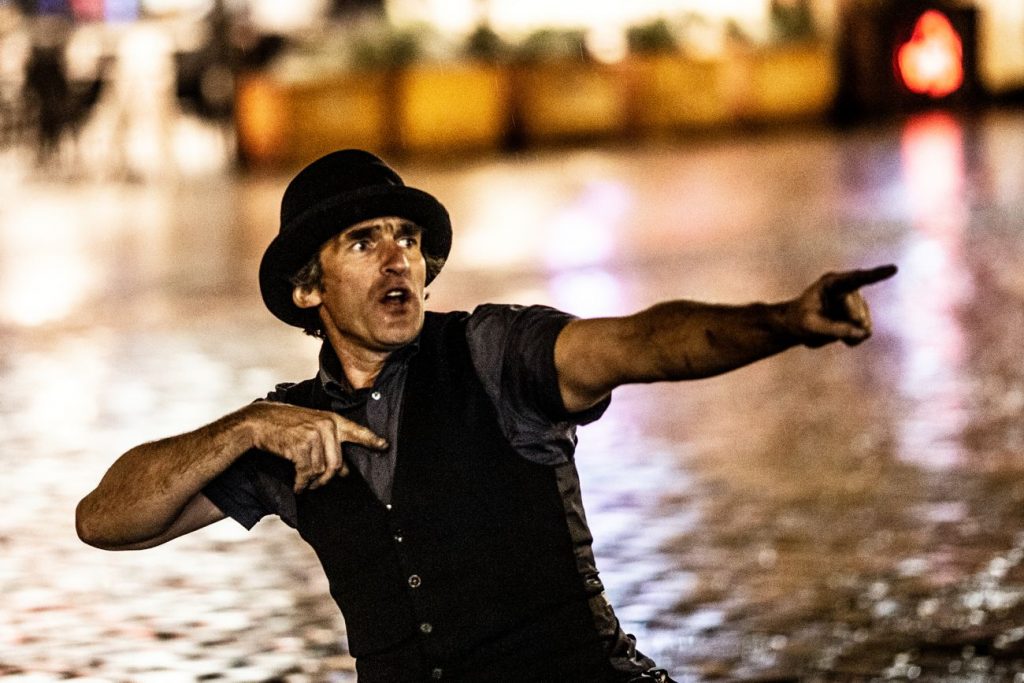
Some jokes work in some places but not in others
Racism, homophobia and other abhorrent behaviour has been vanishing from our street performer world and I am happy about that. (…). I think that you need to have good taste when improvising, don’t pick on someone and get laughs at their expense unless they deserve it and always try to have a positive angle to what you say.
Ian Deadly
Do people all around the world laugh about the same things? Have you had to modify your show to be more “universal”?
Some jokes work in some places but not in others. Here in Italy they like really blatant, physical humour, they don’t appreciate anything ironic or satirical, if they have to think a little about a line then it just goes over the top of their heads for the main part. However if I reflect their behaviour back at them they are able to laugh at themselves, if I point it out clearly.
Further north and on my island the audience appreciates more subtlety in the humour, jokes with double meanings, serious and funny. I adapt where I go and a lot of it depends on language. Many lines I do when speaking Italian make no sense in English and vice versa. I always try to learn a few phrases in the local language which usually goes down well even though I think it is mainly the “look at the monkey speaking our language!” effect.
In countries with less spoken English I try to make my show more physical than spoken and even offer a “silent” version. I recently did my first show exclusively in French and astoundingly it went really well and that was more or less the version I do here so a similar kind of humour went down well. At this moment I am supposed to be performing at a festival in South Korea, for obvious reasons I am not but I was looking forward to seeing what was funny for them. I’d planned a new version of the show with more active material and less blah blah blah. I’ve heard that they find a lot of things funny that we would not. And I was looking forward to the challenge. I’m invited for 2021 so I’ll let you know how that goes.
Are there lines that you don’t cross when you make jokes during your shows or do you believe that everyone is allowed in the street?
I never make fun of things intrinsic to that person. Sexuality, race, gender, disabilities etc Why would I? So called performers who do really need to look at their own insecurities to understand why they do this. I should have mentioned this in answer to an earlier question. Racism, homophobia and other abhorrent behaviour has been vanishing from our street performer world and I am happy about that. I recall some shows from years ago being mainly based around gay jokes, they have changed when they realised that this was not a good thing.
If someone enters my show space when I’m performing then I consider them to be fair game. I try to link my improvisations, spoken or physical to some reality in the situation. For example a classic line is “if this kid interrupts my show again I will sell him into slavery”. My version is “if they interrupt my show again then I will sell them into slavery and then they’ll be sent to Bangladesh or China where they’ll be making those clothes they’re wearing, working with other children of their age.”
In Italy (in Poland too, sadly everywhere it seems) there is a lot of racism and hate stirred up against immigrants and a powerful political party of the far right was until recently in power. I am British and not an EU citizen any more I feel the need to point out that they treat me differently because I am white and English and not black or Asian. I have some jokes along these lines designed to make people think about their reactions to myself and other immigrants to their country. I was doing this a little on the recent BuskerBus tour in reference to the intolerance and homophobia in Poland. I think that you need to have good taste when improvising, don’t pick on someone and get laughs at their expense unless they deserve it and always try to have a positive angle to what you say.
There is one performer who had absolutely no limits, he was never offensive to groups of people or anything like that, he was simply a force of nature that could seemingly get away with anything, physical interactions that I would never attempt and extreme lampooning of people passing by. This is a performer called Pepe and I think he was from London, I saw him at the Fringe in Edinburgh my first year working there and thought “I had no idea you could do that!”
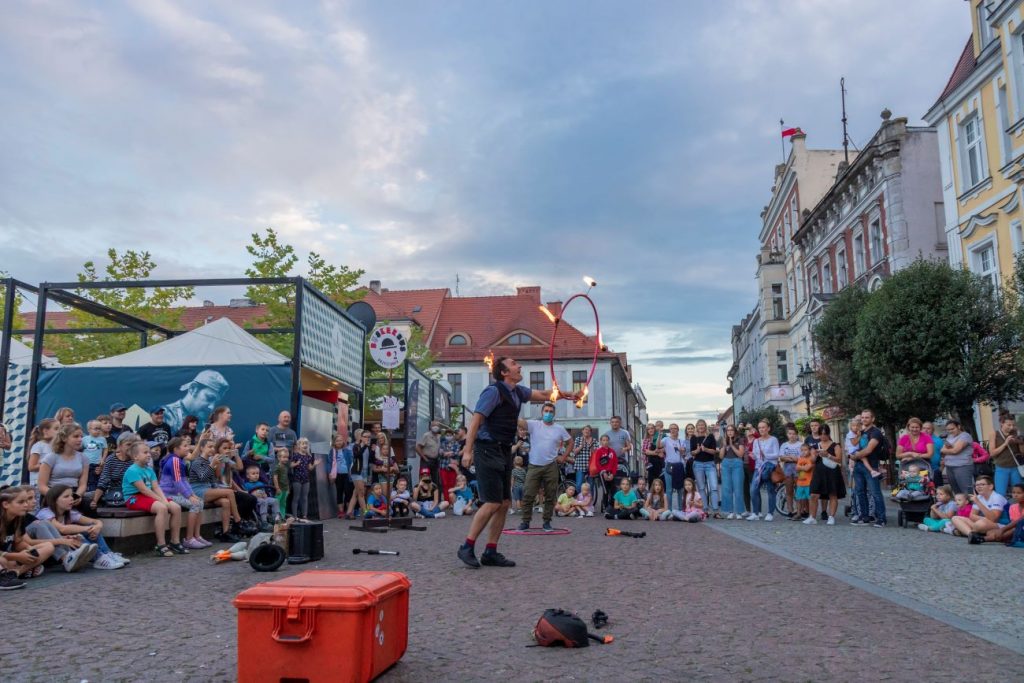
“The People Vs Ian Deadly”
Although you have modified your show, since I have known you it is called “The People Vs Ian Deadly”? How many versions of this show have you created by now? Do you have other shows I don’t know about?.
This is more or less 2.2 of The People Vs Ian Deadly. I can’t really say how many versions tere have been because various numbers come and go and I rarely have a conscious memory of deciding to stop doing a number or when I’ve purposefully included something new. It’s all tried out on the street and the things that work best stick. The big change I guess was about three or four years ago when I switched from doing contact to the hula hoop finale. I’d got bored and so had the audience and I felt embarrassed doing it so I wanted something more more with a volunteer and more silliness and an explosion (there is a plan for version 2.3 in the works). I have another entirely different show with no music, just me shouting, no microphone, just my lungs.
I juggle and do some tricks and lots of silly lines and climb on people and juggle fire for the finale. It was my first “proper” full length show and still occasionally makes an appearance. Then I have another show where I don’t do anything at all, I don’t speak either. This is a following show and I select targets, put different tracks or sound effects on and do silly stuff with them and that’s it. I’ve often done this version as my extra show at a festival if I ask for and get another slot. It’s a lot of fun, chaotic and can last a long time (I did it for two hours once) but doesn’t really generate big hats.
Then I have the shows I did with my partners in the past. The Fabulous Kraprobat Brothers, two drunk, fake Polish clowns, formed with a friend in Edinburgh (BuskerBus 2005), Trip The Switch, formed at circus school with my classmate, offering high energy hand to hand acrobatics and club passing and Koo, a club passing and hand to hand comedy show with my girlfriend of the time. Then back in the mists of time there existed many fire groups, new circus and other performance weirdness with Human Product, In Special Circumstance, FEETBus, 3×2 and others. Did I mention I trained to be a flying trapeze catcher at circus school?
Are there any of your numbers (tricks?) that you are especially proud of or give you the most satisfaction when you perform it?
I’m quite proud of my finale, I’ve been building it from a cabaret number into my finale with a volunteer over the last four years or so. I aimed to have an explosive finale that really draws in the audience together, builds up the energy, makes the volunteer a hero and encourages lots of money in my hat. I also wanted to do something combining the blah blah blah of psychological crowd preparation with some actual skills and I’m quite happy with it. A man doing hula hoop is intrinsically quite funny, very unusual and I’m not so bad so there’s actual skill there. I even get invited to perform in gala shows at hoop conventions occasionally. There is a next level to this number that I’m slowly working out in my mind.
Some of my best and proudest moments have been improvised on the spot, they worked at that moment only and were unique to that show. I like this that my audience always have the chance to enjoy somehow special, only for them instead of exactly the same routines time and time again.
I particularly enjoyed one instance from BuskerBus in Zielona Gora this summer. A little girl, Basia was wandering around in my circle at the start of the show, as they do. I started talking to her, found her name, her age, six years old. Then I said: “Hmmm, I was last here six years ago, wait, who’s your mother? Ania? Where’s your mum?” And then to her mother “Ania! It’s been so long! Why did you never tell me?” Moments like these can be fairly close to the edge but huge fun, her mum was playing along and the audience liked it a lot.
What was the best memory of your street shows?
What a question. I think it was the time I pulled a woman out of the crowd as my volunteer and six months later we were married! No, that hasn’t happened to me. I think it’s that warm glowy feeling inside of you when I’m walking home, pulling my suitcase along feeling satisfied that many people have really enjoyed my shows that day, I’ve made a lot of money, I feel valued as a performer and that I am a professional with a worthwhile occupation. Of course there are many days where the complete opposite happens.
One time I was in Salerno, near Naples in the South of Italy and I’d just done a fun show and the police arrived demanding to see my ID and telling me that I should get out of town. At this point my crowd had just finished putting money in my hat and were walking away, until they saw the police hassling me. Then they all came back in to close around the three police shouting in their faces “Leave him alone! He’s a bravo artista! Go away and do your job! Let him work!”. As only a crowd of indignant Southern Italians can be, lots of shouting and waving of arms.
The police called in reinforcements, two police cars showed up with flashing lights and still there were about one hundred people shouting at these three police, then eight of them stuck in the middle. I thought I’d created a riot. Then a journalist found me on the bench where I was sitting enjoying the show and told me he’d seen everything from his office window on the square where he was and asked me what happened. Then suddenly everyone stopped shouting and waving their hands and went away, the police came back and one of them handed me my passport and apologised to taking it from me. That was a surprise.
There are many memories, perhaps one of the strongest was when I did my first decent hat, real money. I did a duo show with a friend Ross from Ireland who is now Ross Thiffairyan and a great performer. We went to the pub after, counted the money and looked at each other going “ahaa!” Imagine light bulbs popping into existence above our heads. That was the moment we understood that you could live of this and gave it a future.
Do you think that busking should be regulated? If you had to decide, what would be the best busking/permits rules?
I don’t agree with licenses or auditions. If buskers could be trusted to share spaces and respect each other and using the space sustainably (basically not using huge amps and annoying everyone) then there should be no need. However, there are performers who care only about themselves in that moment, who have no wish to share and they don’t care about the damage they do there. When there are people like this then problems develop.
Also many councils feel the need to control everything and so licenses and control and restrictions appear. Something like this has happened here in Turin three years ago, before it was open and free and now you have to book spaces and times but in the last month after many talks with the council they have liberated two spots on the main squares where we can queue up and do shows like before. It has been working out so far which is a huge relief.
Any regulations should follow the natural pattern and timing of street shows instead of forcing performers into time slots that are unrealistic or designed only for one type of busker (in Turin they designed it only for musicians, you could book half hour slots. Too short for a circle show and one hour is too long). I don’t agree. I think the police should have decibel meters and if someone is too loud then they should ask them to turn it down, if they do not then I have no problems with them getting a fine just as for any other unpleasant disturbance.
In an ideal world full of fluffy bunnies and candy floss we wouldn’t ever need any and there would never be problems between us but street performers are not known for their small egos. Joke: What’s the difference between a busker and a rock star? A rock star never thinks they are a busker.
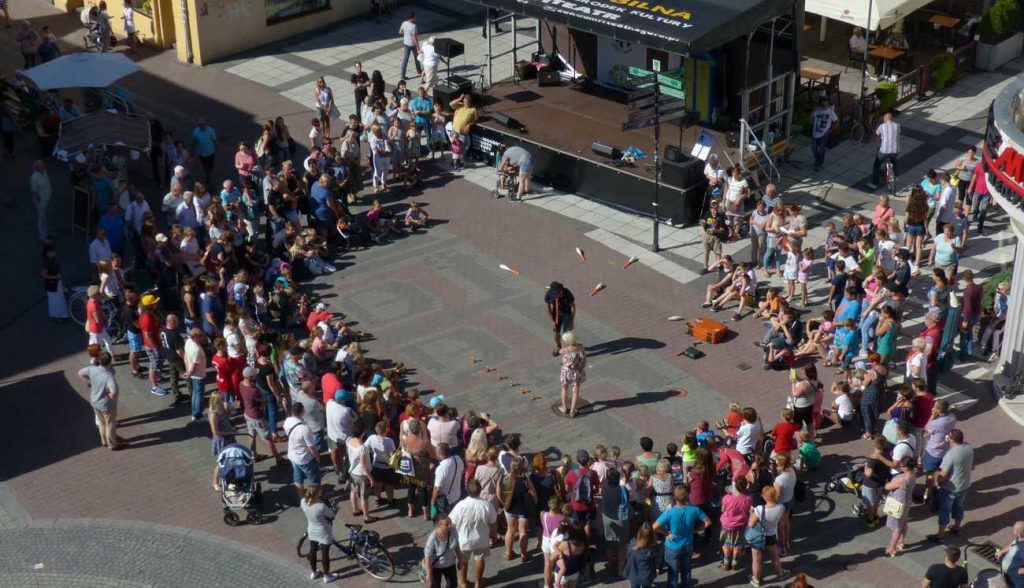
“Work for love or money”
What do you think of busking festivals? What do they give you?
For answer see joke at the end of the last question.
They give me so much. Plenty of money, satisfaction with my job, spreading fun and joy and making people think a little, meeting loads of fantastic people, making connections for work outside of festivals or learning about other possibilities for work, being inspired by others’ shows, inspiring new performers, having the opportunity to try out things that only really work when you have a huge and energetic crowd who loves you, great parties, an international and occasional social life, making real friends.
I get to travel with a purpose, I’ve never really felt like being a tourist, the experience is superficial and it’s difficult to meet people from the place but when I get invited to a new town/ festival/ country then I am their guest and more or less they look after me. Sometimes these people become real friends and there are some places I’ve gone back to year and year and even visited when not working. You get to experience the real life of the place rather than a few museums and restaurants and bars. And get paid for it. Sometimes.
My philosophy is that I work for “love or money” and try to balance my tour each year between big paying festivals and smaller ones that have no real budget to pay you but you get treated so well and they are creating worthwhile events to spread culture amongst their people.
I follow Artisti di Strada Torino and it looks like there are quite many buskers there. What is the busking community in Torino like?
Put fifteen cats in a large bag. Close the bag. Shake the bag. It’s only like that sometimes. Torino is a funny place, there are two circus schools, a physical theatre school and many places offering courses in circus skills and they all produce many people who call themselves street performers but you will never see them performing in the street here. They tend to only work festivals, paid jobs and the seaside in the summer. I don’t count them as real street performers.
There are only a very few of us left who are not musicians who have continued working the street here since the introduction of the booking system. Before this you could get five or six people queuing up for the main spots. This weekend is was only myself doing circle shows and several musicians. If you go down to the centre you will find around ten men with beards and guitars, two women and three men with electric pianos, two bubble guys (one is good), three or four bands playing Italian folk to Led Zeppelin and myself and some special one off acts that are pretty unique and I’ve not seen elsewhere. There is another circle performer who works sometimes but he doesn’t respect other performers and is rather aggressive so I try to avoid him.
Things have changed but I think more circle shows will be back (taking up my space dammit!). About a year ago we started a group here amongst the various performers to have a space to talk about our issues and organise a defence against more restrictions from the council. On the whole this has been really positive, some meetings have been rather difficult and some people prefer to argue and shout instead of listening and finding compromises but miraculously we managed to work together to agree on our position and take our ideas to the council and more or less we got what we wanted. Still, on a good Saturday or Sunday we call it Torino Busking Festival because a short walk through the city will give you plenty of variation (once you get past the pianists) just like a street festival.
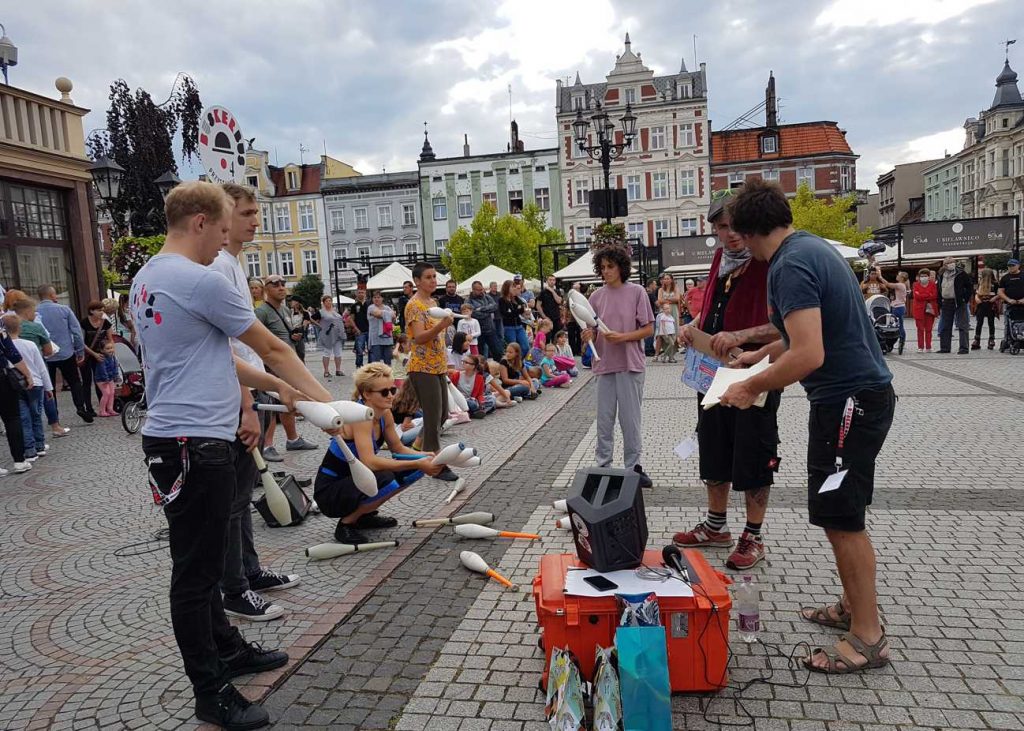
What is your favourite place to busk?
Polska! I really enjoy the BuskerBus Festival and coming to your country. Of course. Why even ask? Also I like smaller places that seem to have never had a busker there. Small towns where nothing much happens are usually great because they are so happy to have you there and really appreciate it once they understand that you are not a travelling carnival come to steal their children and beg on the street. This is why Krotoszyn is the best town on the tour, it took a while but now we are really accepted by the people there and I have done some fantastic fun, big shows.
I also have a soft spot for festivals in Austria, I find them to be really welcoming, well paying and never afraid to join in, be shameless and let themselves go as audience members or volunteers. Also, they have a very long history with street festivals and know how it works. Oh yes, Switzerland isn’t bad either.
What are the skills that you don’t have but would like to or plan to develop?
I’m fairly happy with the skills I have, I’d like to learn more hula hoop and I train sometimes with a group here but mainly I want to improve my street skills. We are always learning and each new audience brings new situations and reactions to my show. I just have to keep performing and I’m always learning while working.
Online busking shows
Crowd building an online show is all about getting word of mouth out there to convince people to be at their screens at a certain time.
Ian Deadly
During the pandemic, you did some online shows? Was it difficult without the real audience? How was your experience?
I am very happy that I did my five online busking shows, they gave me something to do and a timetable. I knew that in one week I would be doing a show so I had to motivate myself to sort it all out. These shows got me working and creating too, I couldn’t simply do my show five times as I think about half the audience each time was the same so I had to create new material which was a bit of a challenge. I spent hours searching for new (copyright free!) music on the internet and sometimes used music from busking friends. I used some BuskerBus favourites Canales and Kapela Timingeriu (with permission) tunes in there too and I’m really grateful to them for helping me out.
I decided that I would do it as a street show, start slowly, build an audience and look around me, not just at the camera to give the impression that I had a huge audience instead of no one with me at all. I came to realise that doing this you are not doing a street show you are doing an online street show. You are performing in streaming and you have to learn how to do that. Crowd building an online show is all about getting word of mouth out there to convince people to be at their screens at a certain time.
I used PayPal for people to send me money and the response was fantastic, these shows paid my rent, bills, food and everything all through the lockdown. Maybe the show that was the most fun was the fire show. I started in my bedroom and then turned the camera around onto the street and ran downstairs. I live on the first floor and there’s a church across the road so it was a good backdrop with no parked cars. I had all the neighbours out on their balconies and people watching from buildings all the way down the street, clapping and cheering. I have to say that doing a show with actual live human beings responding was a huge boost and a reminder of what it’s all about. In the end I had several new routines, some jokes and a new finale or cabaret concept come out of the shows.
Doing these also got me in touch with some friends I haven’t talked to for years, I’d find twenty US dollars being paid into my PayPal, then write to say thanks and have some good chats with people I’d lost touch with. Bizarrely for me the lockdown was a more sociable, more creative and somehow busier time than usual for me.
As you studied literature, I must ask you about your favourite books.
My favourite genre is science fiction, the good stuff. I particularly enjoy post apocalyptic novels so this year has been like living in such a situation, albeit more boring than we thought it would be. I like many kinds of books, especially if they are weird in some ways. Kurt Vonnegut, Neal Stephenson, China Mièville, Ian Banks, Jack Vance, David MItchell, Haruki Murakami, Jim Dodge, Thomas Pynchon, Tim Powers, Tolkein, Ray Bradbury and on and on.
Have you read any Polish writers?
Only a couple, Stanisław Lem, the great science fiction writer and Adam Mickiewicz who was introduced to me by a Polish friend years ago when I first started performing at festivals in Poland. Maybe I have read some more but if you can recommend me any good authors I’d be happy to read them.
Oczywiście, I will make a list. What are your goals and what can I wish for you?
What we all want: return to “normality” and a healthy 2021 street festival season. I would like to be booked more at festivals outside of Europe, I would like more experience of working with different cultures more alien to our European lifestyle. I did my first show in French this year so I will perhaps try to find some way to get booked in France, I’ve always resisted it which is ridiculous as they have a huge number of festivals and I’ll need to improve my language skills for that (I also need to improve my Polish). I’m also looking to work more presenting events and shows (some great jobs cancelled this year) and to teach my workshops (also cancelled). If I have a year next year that is as the one I had cancelled this year then I will be very happy.
Dziękuję bardzo for asking me to be interviewed, I’ve enjoyed thinking about the answers though if I were to answer again you might be likely to get some very different responses. What can you wish me? Wish me plenty of bookings, happy audiences, good weather and heavy hats!
Dziękuję, Ian! Tego Ci życzę, a następny wywiad przeprowadzę z Tobą po polsku!
About Ian
Ian Deadly – an English performer based in Turin, Italy. MA in literature and philosophy, circus school graduate, juggler, actor, MC and Compère, Balkan DJ, teacher, flying trapeze catcher, acrobat, mime and above all; street performer.
A juggler for more than 28 years. He started performing in the streets in 1997. The hat is his paycheque.
He has worked solo and in other groups specialising in juggling and hand to hand acrobatics, he has attended numerous workshops in theatre, mime, dance and juggling. In 2006 he decided to go to circus school in Turin, Italy, where he works constantly in his “home” piazza.
Website: https://www.iandeadly.com/
Instagram: https://www.instagram.com/iandeadly/
